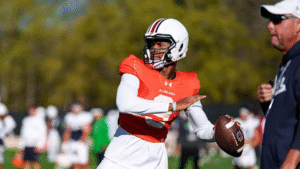
Auburn’s Quarterback Situation in 2025: Arnold’s Role, Daniels’ Experience, and Knight’s Potential
As the 2025 college football season inches closer, the Auburn Tigers have made a decisive shift in their quarterback room. At the forefront is Jackson Arnold, the new face of the program and the team’s confirmed starter under center. But while the starting job is secure, a compelling subplot is developing behind him: the battle for the backup quarterback role, where Stanford transfer Ashton Daniels and five-star freshman Deuce Knight are both being evaluated for situational duties.

Auburn’s Quarterback Revamp in 2025
After a 2024 campaign that left plenty to be desired on the offensive side of the ball, particularly under center, the Tigers committed to revamping their entire quarterback depth chart in preparation for the 2025 season. Leading the overhaul was the acquisition of Jackson Arnold, a heralded talent expected to be the solution to Auburn’s long-standing quarterback inconsistencies.
However, the Tigers didn’t stop there. They added depth and long-term potential to the room with the signing of Deuce Knight, a true freshman ranked among the top quarterback recruits in the nation. Knight’s high school credentials and dual-threat capabilities made him one of the most coveted players in the country. Auburn also acquired Ashton Daniels, a battle-tested signal caller from Stanford, who offers valuable experience and athleticism to the mix. Daniels served as a two-year starter in the Pac-12, giving him a resume full of real-game reps and high-level competition.
Hugh Freeze Takes a Situational Approach
Despite the clarity at the top of the depth chart, Auburn head coach Hugh Freeze has not publicly committed to a definitive No. 2 quarterback. When asked directly about who will be the primary backup to Arnold, Freeze offered a nuanced response that emphasized flexibility over rigid hierarchy.
“Probably situational,” Freeze commented during a recent media session. “Ashton has a ton of experience with plus-one runs at quarterback and obviously throwing the football. He put up some really, really good numbers rushing-wise in a good league. I think you have to look at that a little differently.”
Freeze’s comments reflect a broader strategy that leans into the unique strengths of each quarterback, rather than forcing a one-size-fits-all backup plan. The phrase “situational” is key—Auburn seems poised to deploy each quarterback in ways that maximize their individual talents in specific game scenarios.
Ashton Daniels: The Proven Veteran
Among the two battling for the backup job, Ashton Daniels brings the most experience. A former Stanford Cardinal, Daniels rushed for 669 yards last season—an impressive number for a quarterback at the FBS level. His standout moment came against NC State, where he matched the school’s single-game rushing record for a quarterback, piling up 129 rushing yards. This dual-threat capability is what has Freeze excited about using Daniels in specific short-yardage or red-zone situations where quarterback runs become more valuable.
Daniels isn’t just a runner, either. He has shown he can throw the football competently, managing games and making key throws in pressure moments. His maturity and on-field awareness, sharpened over multiple seasons at Stanford, give him an edge when it comes to handling complex defensive looks and making adjustments at the line of scrimmage.
Deuce Knight: The Future of the Program
While Daniels represents the immediate support system for Arnold, Deuce Knight symbolizes Auburn’s future. A raw yet supremely talented prospect, Knight was one of the most highly sought-after quarterbacks in the 2025 recruiting cycle. His high school career was filled with highlight-reel plays, explosive arm strength, and tremendous athleticism.
According to MaxPreps, Knight’s final high school season saw him throw for 2,256 yards and 25 touchdowns through the air while also rushing for 484 yards and scoring 12 times on the ground. His ability to extend plays, make off-platform throws, and beat defenders with his legs gives him a high ceiling as a dual-threat quarterback.
Still, Freeze is being cautious with how he integrates Knight into live-action scenarios. “I don’t really want to throw Deuce out there and call quarterback runs,” Freeze explained. “Not that he can’t do it, but you want him to be ready for all that. You look at certain roles or certain situations, and I think there’s two different deals going on.”
What Freeze is hinting at is a developmental timeline for Knight that ensures he’s not overwhelmed early in his college career. The coaching staff seems determined to bring him along slowly, letting him learn behind Arnold while possibly using him in controlled environments that match his strengths—such as vertical passing situations where his arm talent can shine.
Strategic Depth: A Role for Both Backups
Rather than designating a strict No. 2 and No. 3 on the depth chart, Auburn may instead operate with a dual-backup system where both Daniels and Knight play depending on what the moment calls for. Freeze elaborated, saying, “If I need somebody to go in and throw a vertical route, Deuce may be the better option there. So I think everything is situational.”
This mindset suggests Auburn is building a quarterback room where flexibility reigns supreme. While Jackson Arnold is expected to handle the bulk of the offensive responsibilities, having two different backup quarterbacks who each offer unique skill sets can be a huge asset in the event of injury, fatigue, or special game packages.
This is particularly relevant given how physically demanding the SEC can be on quarterbacks. In such a conference, having multiple competent quarterbacks ready for action is not just beneficial—it’s often necessary.
Preparing for the Unexpected
In a perfect world, Jackson Arnold plays every down of the 2025 season and leads the Tigers to a winning record, possibly even contending for an SEC title. However, football rarely unfolds according to plan. Injuries, slumps, and unforeseen challenges often force teams to dig deeper into their depth charts. Auburn seems well aware of this reality and is preparing accordingly.
Freeze has made it clear that this isn’t about favoritism or long-term politics—it’s about putting the team in the best position to succeed in every scenario. Whether that means turning to Daniels in a short-yardage situation or calling on Knight to air it out late in a game, the Tigers are constructing a system that values adaptability and preparation over rigidity.
Furthermore, giving Knight some mop-up duty—playing time in games that are already decided—will allow the coaching staff to evaluate his readiness while helping him acclimate to the speed and physicality of SEC football without throwing him into the fire prematurely.
Building Confidence in Arnold
At the same time, Freeze is also focused on ensuring Jackson Arnold thrives in his first year as Auburn’s leader on offense. The coaching staff’s message has been consistent: Arnold is the guy, and they are committed to putting him in the best position to succeed.
This includes giving him full control of the offense and surrounding him with the support structure he needs—from offensive linemen to playmakers to backup quarterbacks who can step in without disrupting the rhythm of the team.
Confidence is key, and Freeze knows that Arnold will perform at his best if he feels empowered by the staff and supported by a system that doesn’t look over his shoulder. That said, the presence of Daniels and Knight gives Arnold room to grow, knowing there’s a safety net in place should anything go wrong.
What It All Means for the Season Ahead
As Auburn heads into fall camp and begins its preparations for the grueling SEC schedule, the quarterback situation is both solid and dynamic. Jackson Arnold is the centerpiece, but behind him lies a depth chart built not just on talent but on strategic thinking.
Ashton Daniels brings experience, durability, and running power, making him a viable backup in many traditional senses. Deuce Knight, while still green, has all the tools necessary to become a future star and can be used in specific scenarios that highlight his passing abilities.
Coach Hugh Freeze is not interested in prematurely forcing a label on either quarterback. Instead, he wants to maximize the Tigers’ versatility by assessing game-by-game and play-by-play who offers the better chance to succeed.
This layered, situational approach to the quarterback room reflects the evolving mindset of modern college football coaching. Rather than a rigid pecking order, Auburn is opting for a fluid, adaptive strategy that not only addresses the present but also sets the stage for the future.
Fans may hope they never need to see what life without Jackson Arnold looks like, but if that day comes, it’s clear that Auburn is making sure they’re ready. Whether it’s Daniels taking over with his legs and game savvy or Knight launching deep throws in garbage time, the Tigers have built a quarterback room that is ready for anything 2025 might throw their way.
Leave a Reply